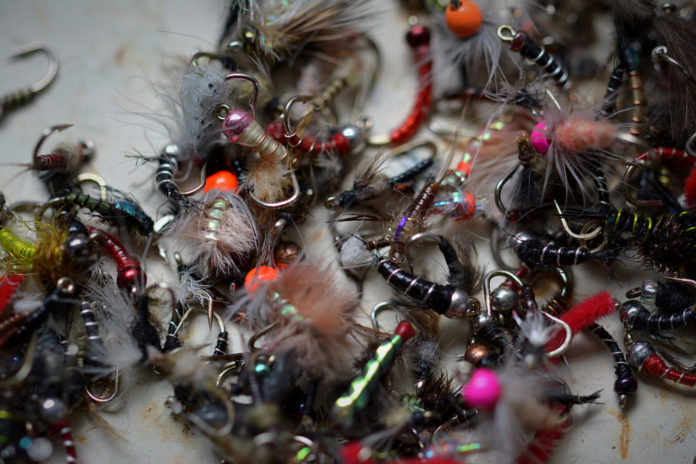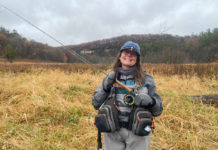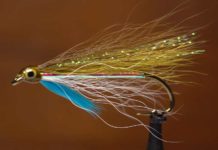Written by: Pete Shanafelt, Bighorn Angler
A “mixed bag” of spring nymphs for fishing the Bighorn.
Photo courtesy Bighorn Angler
Sorting through the many mayfly fly patterns on the market today can be confusing, as there are a plethora of “bin appeal” patterns and not so many with real “trout appeal.” The patterns listed below are representative of the many styles of mayflies we fish on the Bighorn River. By changing the size and color, you can match most tailwater mayfly hatches across the Western U.S. We’ll cover each stage of the mayfly life cycle, focusing on our most popular Bighorn mayfly, the Baetis (blue-winged olive). All the flies below are must-have patterns for anglers visiting the Bighorn throughout the season.
Immature Nymph
The Quill Nymph is staple pattern of the Bighorn River, and the bug features an ultra skinny profile and just enough flash to fool the pickiest of fish. Keep this pattern sparse, which is the main trick to the effectiveness of this bug. We also fish a glass bead version of this pattern. It is extremely effective when fish get feeding heavy on the emerging Baetis nymphs. Just add a gunmetal x-small bead.
Black Quill Nymph
Hook: 1X-long nymph hook, size 12-18.
Thread: Black, 8/0 or 70-denier.
Tail: 3 or 4 natural pheasant-tail fibers.
Body: Black thread.
Rib: Gold Ultra Wire, size x-small.
Wingcase: Medium pearl tinsel.
Thorax: Peacock herl.
Variations: Pseudo Quill (cream body, cream thorax) and Olive quill (olive body, peacock thorax).
Mature Nymph
The Split Nymph is an innovative nymph pattern is a highly important bug to have prior to most mayfly emergences. The pattern imitates drifting nymphs just about to break the surface. The pronounced foam wing case acts as a “trigger” for the fish, making them selectively pick out these types of bugs during the nymph drift. We fish a Tungsten-bead version, as well, which doubles as an excellent dropper.
Split Case PMD Nymph
Hook: 1X-long nymph hook, size 12-20.
Thread: Dark brown, 8/0 or 70-denier.
Tail: 5 to 7 partridge fibers.
Rib: Black Ultra Wire, size small.
Abdomen/Thorax: Rusty brown Nymph Dub.
Wingcase: 2 dark brown goose biots and yellow foam.
Legs: 4 partridge fibers.
Variations: There is a BWO version of this pattern, but we have found the PMD version in size 20 fishes even better, as our Bighorn Baetis nymphs are almost black in color. If anything, you may want to change the foam wing color to a more olive tint to match the emerging BWO nymphs.
Click here for five more patterns to complete the mayfly life cycle.
Pete Shanafelt is co-owner Bighorn Angler in Fort Smith, Montana.
Credit: Source link































